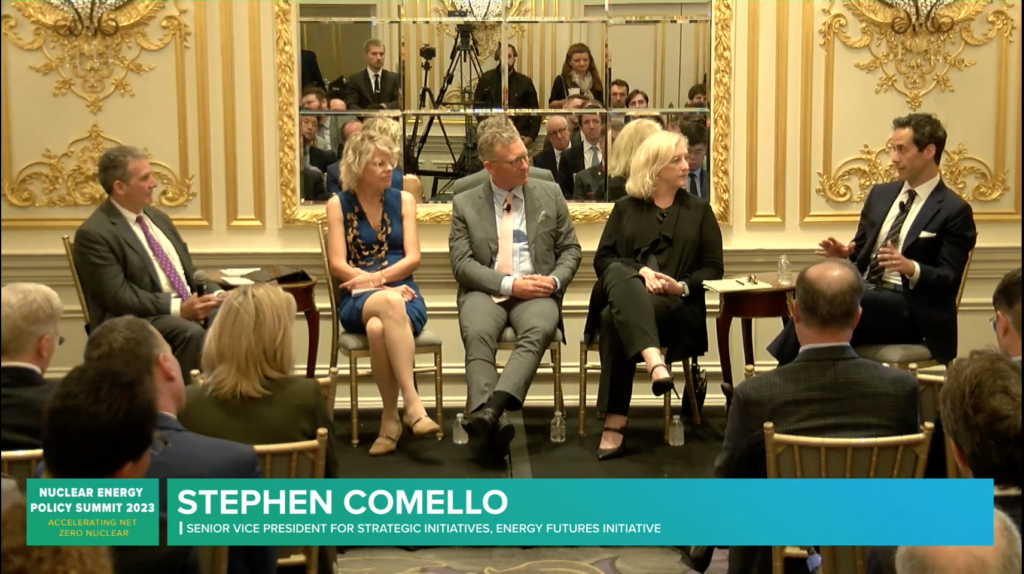
EFI Foundation Senior Vice President Stephen Comello highlighted an innovative approach to financing for small modular nuclear reactors (SMRs) during his remarks in a panel discussion at the Nuclear Energy Policy Summit 2023: Accelerating Net Zero Nuclear on September 18. The two-day inaugural summit, hosted by the Atlantic Council and the Emirates Nuclear Energy Corporation, took place on the sidelines of Climate Week NYC and the United Nations General Assembly.
Comello spoke during a session on “Innovation in Nuclear Project Finance,” with fellow panelists Kirsten Cutler from the U.S. Department of State, The Hon. Lisa Raitt from CIBC Capital Markets, James Schaefer from Guggenheim Partners, and moderator Will Wade from Bloomberg News. The panelists discussed the challenges of financing nuclear projects and presented ideas on how to build on current momentum around the industry in the United States and elsewhere.
Speaking to the current state of affairs for SMRs in the United States, Comello noted: “There’s a lot of excitement in the market, and that’s great to see, but we’re not quite there yet.”
SMRs are projected to be more cost-effective than conventional, large-scale nuclear reactors due to their modular design, which allows them to be largely factory-built and then shipped to a location and installed on-site. One of the biggest challenges to funding SMR projects, however, is the financial uncertainty for investors and developers around first-of-a-kind SMR designs.
“No one wants to be the first mover,” said Comello. “Everyone wants to be the fifth, sixth, or seventh mover. … If everyone thinks they’re going to go first, no one is going to go. [It’s] a collective action problem. But this is a solvable problem.”
Comello focused on a creative new solution to establish sufficient demand through a “buyers club” and address cost risk: forming an “orderbook” of SMRs (i.e., multiple, identical installations of a particular design), where costs are spread across plant builds, coupled with a new cost stabilization facility to address the dual barriers of cost magnitude and cost uncertainty.
The concept—which is an active thread of ongoing research at the EFI Foundation’s Energy Futures Finance Forum (EF3)—would bring project sponsors (i.e., investors), customers, and the federal government together at the start and help alleviate cost risk among all players.
“Everyone in that consortium gets the average price—not the first price and not the last price,” said Comello. “That way, you eliminate the first-mover disadvantage.”
Specifically, the cost stabilization facility would use existing federal government lending authority to buffer against unanticipated cost overruns. Comello emphasized the importance of bringing government and the private sector together to enable and grow the SMR industry in the United States.
“With existing administrative authorities, we can create a type of insurance product within the federal government to insure against cost overrun risk,” Comello said. “It’s in the national interest to support that. … We are creating data and information and proving an entire industry.”
The new approach Comello discussed on the panel will be detailed in a forthcoming working paper from the EFI Foundation’s Energy Futures Finance Forum (EF3).
Watch the event recording.
– Callyn Bloch, Communications Fellow; and Adrienne Young, Senior Communications Lead
(Share this post with others.)




